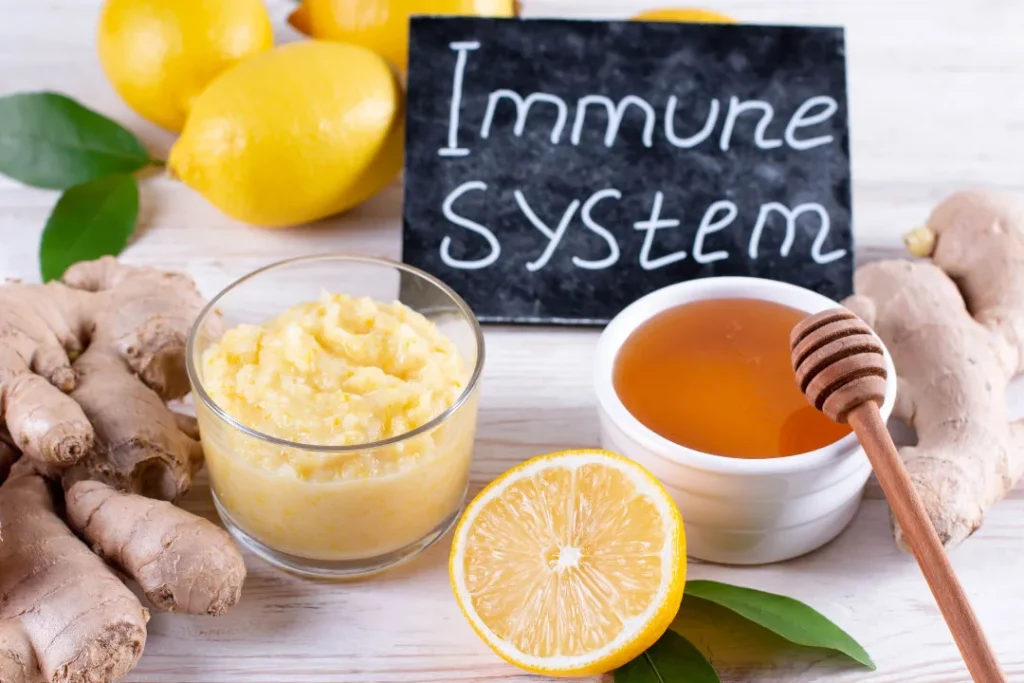Fermented Wheat Germ Extract (FWGE), often marketed as Avemar, is becoming more well-known for its conceivable health advantages. The nature of FWGE, its health advantages, ideal dose for you, potential side effects, drug interactions, and the underlying chemistry and physiological mechanisms that underlie its effects on the body and brain will all be thoroughly explained in this article.
You May Also Like:
The 7 Most Powerful Huperzine A Brain Benefits
A Nootropic Herb for Cognitive Enhancement: Discover Bacopa Monnieri Benefits and Side Effects
Fermented Wheat Germ Extract: Benefits, Dosage, Side Effects, Drug Interactions, and Other Important Information is an original (NootropicsPlanet) article.
Nature of Fermented Wheat Germ Extract
FWGE is produced through the fermentation of baking yeast (Saccharomyces cerevisiae), specifically of wheat germ, the embryonic portion of the wheat kernel. Notably, 2,6-dimethoxy-p-benzoquinone and 2-methoxy-benzoquinone are the main physiologically active benzoquinone compounds found in FWGE.
The family of chemical molecules known as benzoquinones shares structural similarities with quinone, except that it has two methoxy groups in place of the two hydroxyl groups. These substances support the anti-cancer, immunomodulatory, and antioxidant effects of FWGE usage.
Health Benefits of Fermented Wheat Germ Extract
The immunomodulatory and anticancer effects of FWGE are well known. FWGE modifies immunological responses by affecting the activity of natural killer (NK) cells, aiding in the body’s natural defense against tumor cells.
Additionally, relevant scientists have researched and discovered that FWGE inhibits the Warburg effect, or the cancer cells’ inability to use glucose for energy. Thus, FWGE prevents cancer cells that quickly are multiplying from accessing their energy source, halting their proliferation, resulting in the conclusion that FWGE has anticancer properties.
The FWGE extract has also been linked to a decrease in the negative effects of traditional cancer therapies including radiation and chemotherapy. By reducing side effects including weariness, appetite loss, and discomfort, FWGE may improve a patient’s overall sleep quality of life while they receive these medicines.

Chemistry of Fermented Wheat Germ Extract
Fermented Wheat Germ Extract’s (FWGE) powerful effects are a result of its complex chemical make-up. Its bioactivity is mostly caused by benzoquinones, more especially 2,6-dimethoxy-p-benzoquinone and 2-methoxy-benzoquinone. These are quinone derivatives, which are chemical compounds with a six-membered aromatic ring and two ketone substituents as their defining characteristics.
Because benzoquinones have two methoxy groups instead of the two hydroxyl groups in quinone, they possess special molecular traits that make them potent antioxidants. By neutralizing dangerous free radicals thanks to their capacity for redox reactions, they lessen oxidative stress in the body.
Physiological Mechanisms of Action
Wide-ranging physiological effects of FWGE include impacts on the immune system and metabolic functions.
Metabolic Impact: FWGE has a considerable impact on the metabolism of cancer cells, specifically by targeting the Warburg effect. Even in oxygen-rich environments, cancer cells frequently exhibit this phenomenon, which entails a change from aerobic (oxygen-dependent) metabolism to anaerobic (oxygen-independent) glycolysis. This switch enables the fast multiplication of cancer cells. The active ingredients in FWGE disrupt this glycolytic process, starving cancer cells of their main energy source and triggering apoptosis, or programmed cell death.
In addition to its effects on metabolism, FWGE also has significant effects on the immunological system. Natural killer (NK) cells, a subset of white blood cells essential to the body’s fight against cancer, have their cytotoxic abilities improved by it. FWGE improves the body’s intrinsic ability to recognize and then get rid of cancer cells by stimulating these cells.
Knowing these pathways can help in understanding FWGE’s potential therapeutic uses, especially in the context of cancer therapy. To fully understand the physiological effects of FWGE and its interactions with other drugs, further research is required.

Optimal Dosage
The best FWGE dose will depend on which of your medical problems it is being used to treat. Adults are often advised to take 8.5 grams per day, or one Avemar sachet, as a drink after blending the sachet’s contents with water or fruit juice.
Side Effects
FWGE typically has a modest side effect profile and is generally well tolerated by most. But some people could have moderate gastrointestinal symptoms including gas, bloating, or nausea as a result of use. Moreover, because FWGE has immune-boosting qualities, those of you with autoimmune illnesses should use it with caution because it may make symptoms worse.

Potential Substance Interactions
There is currently little information available on how FWGE interacts with other drugs. But since it has the capacity to alter immune response, it may conceivably interact with immunosuppressants and lessen their effectiveness. Before beginning FWGE, it is advised that anyone using immunosuppressive medications speak with their doctor.
Best Responsible Use
FWGE is a potential dietary supplement that utilizes wheat germ’s advantages for good health. Due to its special metabolic and immune-modulating actions, it has advantages in the treatment of cancer and is therefore a beneficial supplementary therapy. To use it safely and effectively, you must have a thorough awareness of its dose, potential adverse effects, and interaction, which this article has made an effort to address. Further investigation into the specific mechanisms and wider uses of FWGE may provide novel therapeutic directions.
Fermented Wheat Germ Extract:
Conclusion
FWGE is rich in nutrients and is derived from the kernel of wheat, an already widely popular crop. The availability of this extract to be used to alleviate and prevent health issues is growing. The fermentation process, used exclusively with baker’s yeast, seems to concentrate and amplify the nutritional properties and elements of the chemical structure that lend itself to health benefits.
All in all, it is a nutrient dense supplement that can be taken separately from meals, such as in the form of a beverage, or integrated in recipes. It’s potential to fight cancer is impressive, as a form of treatment or as part of a treatment management program, subordinate to chemotherapy, for example. FWGE is also appealing because it is safe for general use and results in limited and minor side effects for most users, but consultation with health professionals is always urged.

References:
- “Avemar (Fermented Wheat Germ Extract) in Cancer Treatment and Prevention.” Retrieved From: https://pubmed.ncbi.nlm.nih.gov/20155632/
- “The Warburg Effect and Its Role in Tumourigenesis.” Retrieved From: https://pubmed.ncbi.nlm.nih.gov/31473944/
- “Metabolic Targets for Cancer Therapy.” Retrieved From: https://www.nature.com/articles/nrd4145
Important Note: The information contained in this article is for general informational purposes only, and should not be construed as health or medical advice, nor is it intended to diagnose, prevent, treat, or cure any disease or health condition. Before embarking on any diet, fitness regimen, or program of nutritional supplementation, it is advisable to consult your healthcare professional in order to determine its safety and probable efficacy in terms of your individual state of health.
Regarding Nutritional Supplements Or Other Non-Prescription Health Products: If any nutritional supplements or other non-prescription health products are mentioned in the foregoing article, any claims or statements made about them have not been evaluated by the U.S. Food and Drug Administration, and such nutritional supplements or other health products are not intended to diagnose, treat, cure, or prevent any disease.


